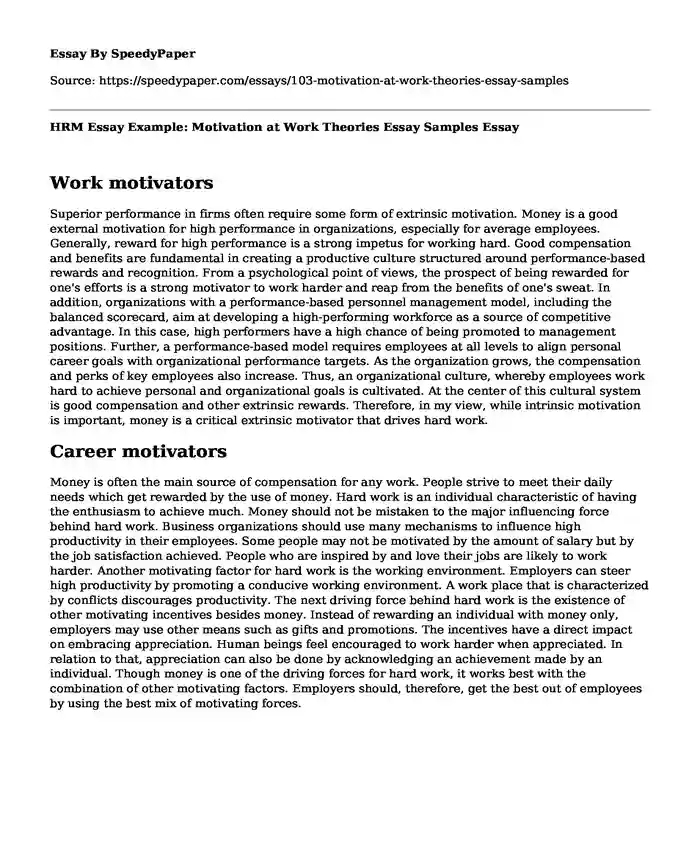
| Type of paper: | Essay |
| Categories: | Human resources Job Motivation |
| Pages: | 2 |
| Wordcount: | 442 words |
Work motivators
Superior performance in firms often require some form of extrinsic motivation. Money is a good external motivation for high performance in organizations, especially for average employees. Generally, reward for high performance is a strong impetus for working hard. Good compensation and benefits are fundamental in creating a productive culture structured around performance-based rewards and recognition. From a psychological point of views, the prospect of being rewarded for one's efforts is a strong motivator to work harder and reap from the benefits of one's sweat. In addition, organizations with a performance-based personnel management model, including the balanced scorecard, aim at developing a high-performing workforce as a source of competitive advantage. In this case, high performers have a high chance of being promoted to management positions. Further, a performance-based model requires employees at all levels to align personal career goals with organizational performance targets. As the organization grows, the compensation and perks of key employees also increase. Thus, an organizational culture, whereby employees work hard to achieve personal and organizational goals is cultivated. At the center of this cultural system is good compensation and other extrinsic rewards. Therefore, in my view, while intrinsic motivation is important, money is a critical extrinsic motivator that drives hard work.
Career motivators
Money is often the main source of compensation for any work. People strive to meet their daily needs which get rewarded by the use of money. Hard work is an individual characteristic of having the enthusiasm to achieve much. Money should not be mistaken to the major influencing force behind hard work. Business organizations should use many mechanisms to influence high productivity in their employees. Some people may not be motivated by the amount of salary but by the job satisfaction achieved. People who are inspired by and love their jobs are likely to work harder. Another motivating factor for hard work is the working environment. Employers can steer high productivity by promoting a conducive working environment. A work place that is characterized by conflicts discourages productivity. The next driving force behind hard work is the existence of other motivating incentives besides money. Instead of rewarding an individual with money only, employers may use other means such as gifts and promotions. The incentives have a direct impact on embracing appreciation. Human beings feel encouraged to work harder when appreciated. In relation to that, appreciation can also be done by acknowledging an achievement made by an individual. Though money is one of the driving forces for hard work, it works best with the combination of other motivating factors. Employers should, therefore, get the best out of employees by using the best mix of motivating forces.
Cite this page
HRM Essay Example: Motivation at Work Theories Essay Samples. (2018, Feb 11). Retrieved from https://speedypaper.net/essays/103-motivation-at-work-theories-essay-samples
Request Removal
If you are the original author of this essay and no longer wish to have it published on the SpeedyPaper website, please click below to request its removal:
- Free Essay on Statistics and Probability Practice Problems
- Essay Example: Medical Malpractice Research
- Essay Sample: The Nausea Short Story by Jean-Paul Sartre
- Business Essay Example for Your Inspiration
- Essay Example Dedicated to Beliefs and Deviance
- General Definition and Origin of Ecclesiology. Essay Example
- Paper Example. Sermon on the Mount
Popular categories




